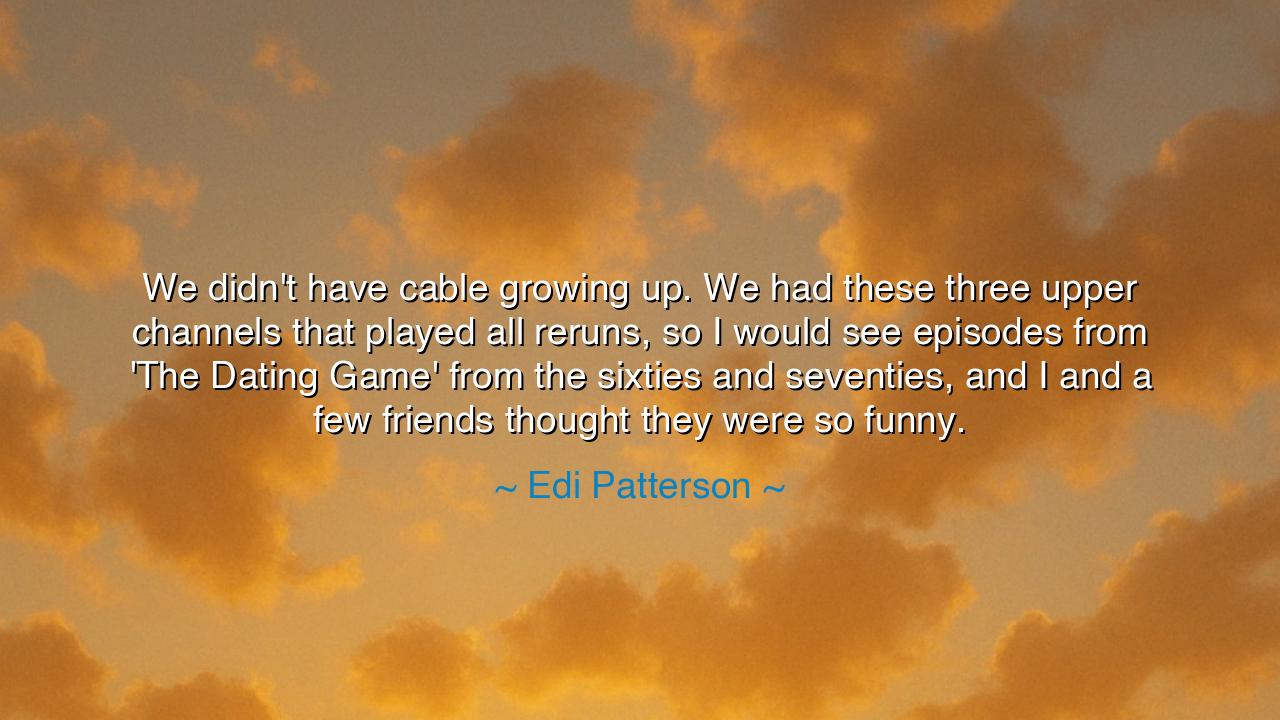
We didn't have cable growing up. We had these three upper
We didn't have cable growing up. We had these three upper channels that played all reruns, so I would see episodes from 'The Dating Game' from the sixties and seventies, and I and a few friends thought they were so funny.






The words of Edi Patterson—“We didn’t have cable growing up. We had these three upper channels that played all reruns, so I would see episodes from ‘The Dating Game’ from the sixties and seventies, and I and a few friends thought they were so funny”—may seem lighthearted, but they carry a quiet and profound wisdom. Beneath their humor lies a remembrance of simplicity, of an age before excess, when joy was found not in endless choice, but in the laughter born of shared discovery. Patterson’s reflection speaks of nostalgia, yes, but also of a truth as old as time: that the soul finds delight not in abundance, but in appreciation.
In those few lines, she recalls a childhood shaped by limits—by only three channels, by reruns from decades past. Yet within those boundaries bloomed creativity and imagination. Where modern life offers thousands of distractions, her world was smaller, but brighter. She did not scorn the past for its simplicity; she rejoiced in it. The reruns—old episodes of The Dating Game—became not just entertainment, but a window into another time, a reminder that laughter, awkwardness, and love are eternal. The ancients, too, would have understood this: that even the humblest joys can nourish the spirit when the heart is awake to wonder.
There is something deeply human in this memory. The child who laughs at the absurdity of the past is also learning from it—seeing, through the lens of time, how people once lived, flirted, dreamed. What was once meant to be serious has become, in retrospect, a kind of comedy. This is the way of all things: time transforms perspective. What one generation takes as fashion, another sees as folly. Yet both, in their own way, are right. Patterson’s laughter, born from reruns of the sixties and seventies, is a laughter of recognition—the timeless joy of realizing that human nature, in all its silliness, remains unchanged.
The ancient philosophers often spoke of this paradox: that wisdom hides in laughter, that to see the humor in life is to glimpse its truth. The Greek playwright Aristophanes used comedy not only to entertain, but to teach. His plays mocked the politics, pride, and vanity of his day—but through that laughter, Athens saw itself more clearly. So too, Patterson’s innocent joy in the old Dating Game episodes teaches us something deeper. She reminds us that laughter bridges generations—that even the relics of old television can carry meaning, connecting the past to the present through shared humanity.
Her memory also reminds us of the power of limitation. When we have too much, we forget to see; when we have little, we learn to look deeply. Those three channels were not a deprivation—they were a classroom in imagination. Each rerun was not just a repetition, but a rediscovery. This is a truth our modern age forgets: that creativity thrives in simplicity. The greatest minds of history—from Leonardo da Vinci to Einstein—worked not amid endless abundance, but within boundaries that forced them to invent, to look closer, to see beauty in the ordinary.
In Patterson’s recollection, there is also the echo of friendship. “I and a few friends thought they were so funny,” she says—and with that, she captures one of life’s most enduring joys: shared laughter. For laughter multiplies when given; it is one of the few treasures that grows the more it is shared. The ancients gathered around fires, the poets shared tales in courtyards, and children like Patterson and her friends gathered around flickering screens—all united by the same impulse: to find delight in the world together.
From this simple memory, we learn a lasting lesson: joy does not depend on abundance. The world may change, technology may evolve, but the heart’s sources of happiness remain eternal—simplicity, laughter, companionship, curiosity. One does not need countless choices to be content; one needs only the willingness to see wonder in what is already there. So, when the noise of the modern world grows overwhelming, remember the wisdom hidden in Patterson’s words: turn back to simplicity. Watch an old story, share a laugh with friends, rediscover the beauty of what is familiar.
For true joy, as the ancients taught, is not found in having everything—it is found in loving what you have. And when you can laugh, even at the past, even at yourself, then you have already touched the timeless harmony that unites all generations. Find laughter in simplicity, and you will never be poor in spirit.






AAdministratorAdministrator
Welcome, honored guests. Please leave a comment, we will respond soon